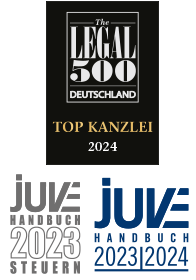- Tax Dispute
- Criminal tax law
- Voluntary Self-Disclosure
- Criminal Tax Proceedings
- Penalty for Tax Fraud
- Limitation Period for Tax Fraud
- Commencement of Criminal Tax Proceedings
- Tax Investigations / Search of Premises
- Freezing Injunction / Seizure of Assets
- Pre-trial Detention for Tax Fraud
- Corruption / Bribery
- Witness in Criminal Tax Proceedings
- Undeclared Income / Illegal Employment
- Criminal Risks for Directors of Limited Liability Companies
- Tax Compliance Management System (TCMS)
- Focus on Tax Compliance and Tax-CMS in Germany
- Missing trader intra-community (MTIC) fraud / VAT fraud
- Commercial Criminal Law
- Internat. Tax Law
- Tax Planning
- Corporate law
- Property Succession
Penalty for Tax Fraud (Sentencing)
If criminal prosecution for tax fraud is impending / Practical notes by the tax law specialist, tax attorney and tax adviser in Cologne
The most urgent questions for clients are: “Do I have to go to jail?” ,or “how high will the fine be?” A search on the internet will not yield clear answers: The unwritten rules relating to sentencing (imprisonment with/without suspension on good behaviour bond, fine) or to a termination of the proceedings against payment of a fine vary widely across the regions. Due to their practical experience, tax defence attorneys develop a feel for the expected severity of a sentence. Jurisprudence and commentary in literature often only provide a personal opinion. Unfortunately, sentencing is mainly a matter of negotiating and is only superficially regulated by law. This also means, that instructing a committed defence attorney will pay off when it comes to sentencing. It is also an important task for defence attorneys in criminal tax matters. In addition to tax considerations, criminal considerations play an important role, which means that a defence attorney should ideally be experienced in tax law and criminal tax law.
1. What are the basic principles in sentencing?
The law provides for a broad range of penalties, including fines and imprisonment. § 370 Sec 1 AO (tax fraud) generally prescribes a fine for tax offences. Imprisonment from 6 months to 10 years is only prescribed in particularly severe cases of tax fraud or organised smuggling.
Note by the tax law specialist in Cologne: So-called sentencing tables do exist. Some of them are however outdated or fail to take regional aspects into account. They are not legally binding but merely an initial point of reference. Differing views on sentencing prevail, even within the same public prosecutor’s office or the same court of law. In the end, the sentence hinges on the negotiation skills of the defence attorney. This means, that the particularities of the individual case must be carved out in a way that benefits the client.
An imprisonment sentence may be suspended on a good behaviour bond (which means that the sentence is for imprisonment but the offender does not have to go to prison) if it is for less than two years.
Comment by the tax law specialist in Cologne: The history of an individual case must be considered, which may lead to a consolidated sentence with actual imprisonment. An earlier suspended prison sentence may be revoked.
In order to achieve the suspension of an inevitable jail term, it is often helpful to aim for a combined jail/fine sentence.
2. How do I know what precise penalty to expect?
Sentencing always considers the individual circumstances of a case. The particular circumstances supporting a reduced sentence should be carved out in detail following the inspection of the case files and a consultation with the client. By taking the mitigating or aggravating circumstances into account, an experienced defence attorney is able to work out an approximate range of the prospective sentence. This is, subject to inevitable uncertainties, often possible during an initial consultation. The particularities of the respective court and investigative authority should also be considered.
The Federal High Court has repeatedly ruled, that imprisonment without suspension on a good behaviour bond (”jail time”) must be considered in cases of tax fraud exceeding 1 million Euro and a suspended prison sentence in cases from EUR 100,000 (EUR 50,000 in certain circumstances). It has however clarified, that the mentioned thresholds are merely indicative and a court may depart from them depending on the individual case. This also means, that a court may depart from them to the detriment of the accused. The general trend in practice is, that the “price-tag” for tax fraud has become more “expensive”. This is particularly the case for termination of proceedings against payment of a fine, because the investigative authorities often threaten to bring the case before the very stringent Federal High Court. We often succeed in achieving a significantly better result for our client. This presupposes significant efforts in substantiating the case and the necessary practical experience. Our tax law specialists in Cologne contribute their experience from their former employment with the fiscal administration.
While an experienced defence attorney will concentrate on carving out mitigating circumstances, the investigative authority will concentrate on the aggravating circumstances.
2.1 Mitigating circumstances
- In the case of tax fraud by delay (”liquidity tool”), only the resulting loss of interest in the amount of 6% p.a. may be considered. Tax fraud by delay means, that the offender “merely” aimed at a delayed payment of taxes due. This would be the case, if a sales-tax advance-declaration is incorrect but the corresponding annual sales tax return is accurate.
- If a voluntary self-disclosure fails (e.g. for lack of completeness), it depends on whether the taxpayer seriously intended to return to legality. In such a case, the voluntary self-disclosure will still be considered a mitigating circumstance.
- If the legislator or the tax administration abets a tax fraud by making it too easy, or fails to intervene against obvious cases of tax fraud, this is also often considered a mitigating factor.
- A voluntary abandonment of the tax fraud prior to detection of the offence;
- Voluntary cooperation in investigations;
- A swift compensation for damages by payment of back taxes (or by payment on account);
- A honest, remorseful confession;
- An excessive duration of the proceedings;
- If the case is limited to attempted tax fraud, because the Tax Authority fails to assess the taxes based on the unlawful tax return.
- Ramifications for public servants and certain professions (e.g. disciplinary proceedings for public servants such as dismissal from service or a professional ban for tax advisers).
The principle of “in dubio pro reo” also applies to mitigating circumstances. This means, that the accused is given the benefit of the doubt in criminal proceedings.
2.2 Aggravating circumstances
Aggravating circumstances are:
- Large-scale tax frauds committed in periods already time-barred for criminal prosecution. The sentence must not be based on these lapsed offences. The Federal High Court has however ruled, that these offences may however be considered to a certain degree in sentencing;
- Tax fraud in respect of taxes held in fiduciary relationships (sales tax, payroll tax) is considered an aggravating circumstance.
- A long-standing systematic tax fraud over a number of years is considered aggravating;
- Additional deceptive actions or the fabrication of false receipts serve as evidence for additional criminal energy. This often entails the risk of criminal prosecution for document forgery, which is not prosecuted by the Office for Fines and Criminal Matters, but by the public prosecutor's office.
3. What significance does the current jurisprudence by the Federal High Court hold?
In its current jurisprudence, the Federal High Court demands, that the sentence for tax fraud exceeding the threshold of EUR 50,000 (if a tax advantage was obtained, e.g. by way of a sales tax refund) or EUR 100,000 (if taxes were withheld by way of submitting a false tax return) should usually not be a fine but a prison sentence suspended on a good behaviour bond. Exceeding the threshold of EUR 1 million will generally preclude a suspended prison sentence. These rules must however not be interpreted as legally binding, as there is no prescribed sentence. A criminal judge must rather consider mitigating circumstances, which means that a better result can be achieved with the help of a committed defence attorney.
Note by the criminal tax attorney in Cologne: While the threshold of EUR 1 million applies for the total tax loss, the thresholds of EUR 50,000 / EUR 100,000 are applied individually to each type of tax (e.g. income tax) for the respective year. If, for example, tax fraud in respect of income tax for 2007 and 2008 has been committed in the amount of EUR 70,000 in each year, the threshold will not be reached, despite the aggregate tax loss in both years exceeding EUR 100,000. There is nevertheless a risk, that a criminal judge will increase the sentence if the defence attorney does not strongly oppose this approach.
4. How is a fine calculated?
The calculation of a fine is based on the daily rate. It is calculated in two steps:
In a first step, the number of applicable daily rates will be determined. This may be between 5 and no more than 360 daily rates. Cumulative sentences for joinder offences may attract up to 720 daily rates.
The amount of the daily rate is assessed in a second step. It may be assessed at a value between EUR 1 and no more than EUR 5,000. It follows, that the maximum fine for joinder offences cannot exceed EUR 3.6 million. The daily rate amount is determined on the basis of the monthly net income (profits) divided by 30. The net income is determined on the basis of the personal and economic circumstances of the offender at the time of sentencing (not at the time the offence was committed). This means, that a relatively minuscule tax fraud may entail a hefty fine, if the offender has a high income at the time of being sentenced. Whether this effect serves the purpose of the penalty to convince the offender and the public remains questionable in our opinion. The defence attorney should work towards penalty discounts in such cases.
The following expenses must be deducted in calculating the daily rate:
- Taxes and social security contributions (not including payments resulting from the offence);
- Costs of private health insurance and reasonable retirement savings;
- Maintenance payments in the amounts actually paid;
- Debts impeding the offender’s quality of life, in as far as their exclusion would result in unjustified hardship (e.g. loans taken out for educational or health purposes);
- Extraordinary expenses, e.g. due to a disability or illness;
- If income is shifted to relatives, it will be included as far as this income benefits the offender directly or indirectly;
- In individual cases, a high net worth can be considered in addition to income.
The court frequently has to rely on the offender’s cooperation in assessing the applicable daily rate. Should the client therefore cooperate? This must be discussed with the client on a case-by-case basis, because being cooperative may be beneficial for the overall result in certain circumstances. The case files often contain information on the financial circumstances and lifestyle of the offender, which enables the court to make arbitrary assessments if necessary. Such an arbitrary assessment is permissible. Not permissible is however the inclusion of current tax files for the assessment of the income and financial situation, because this would violate the tax confidentiality.
Note by the tax law specialist in Cologne: The court often decides on the basis of the combined amount and number of daily rates. This offers opportunities for the defence attorney to adjust certain variables, e.g. to plead for a reduced number of daily rates in case of the daily rate being assessed rather high (or vice versa). This approach is recommended, if a lower number of daily rates is needed in order to prevent the offence from inclusion in the criminal record.
The amount of the fine is also decisive for the type of criminal proceeding: The threshold of 720 daily rates (in the case of an aggregate sentence, or one year suspended jail sentence) must not be exceeded for the purpose of being able to settle the case by a penalty order, which is kept from confidential from the public Otherwise the main hearing will be public (press!).
5. When is an offence recorded in the criminal records?
If a person wishes to apply for employment or is required to furnish a police clearance certificate to his employer or customer at certain times, the defence attorney must keep an eye on the threshold for inclusion in the criminal record, because the convict may only claim a clean criminal record if there is in fact no entry. No entry in the criminal record is made for fines of up to 90 daily rates (or three months imprisonment). The offence may still be included in the criminal record if it is a repeat offence.
6. Can a fine be paid in instalments?
The court may permit the offender to defer payment or pay the fine in instalments.
Note by the tax law specialist in Cologne: For the purpose of settling the case, the taxpayer should make sufficient liquidity available for the payment of a fine. In addition, the back taxes payable plus 6% interest per year will impact on his financial situation. The interest can add up to a significant amount, if the Tax Authority is entitled to tax retrospectively for sometimes more than 10 years (this may result in 10x 6% = 60% interest). Back taxes in the amount of EUR 100,000 over 11 years will attract interest in the amount of EUR 60,000.
If the convict is unable to pay the fine, it is substituted by imprisonment whereby one daily rate corresponds to one day of imprisonment.
In conclusion, a client should have the financial burden and back taxes payable estimated by a tax law specialist prior to sentencing. While the exact level of penalty to be expected in criminal tax proceedings cannot always be estimated accurately, establishing a range of possible sentences should be possible. Back taxes and applicable interest can both be calculated accurately.












Cologne
An der Pauluskirche 3-5,
50677 Cologne,
Telephone: +49 221 39 09 770
Zurich
Tödistrasse 53,
CH-8027 Zurich,
Telephone: +41 44 212 3535




